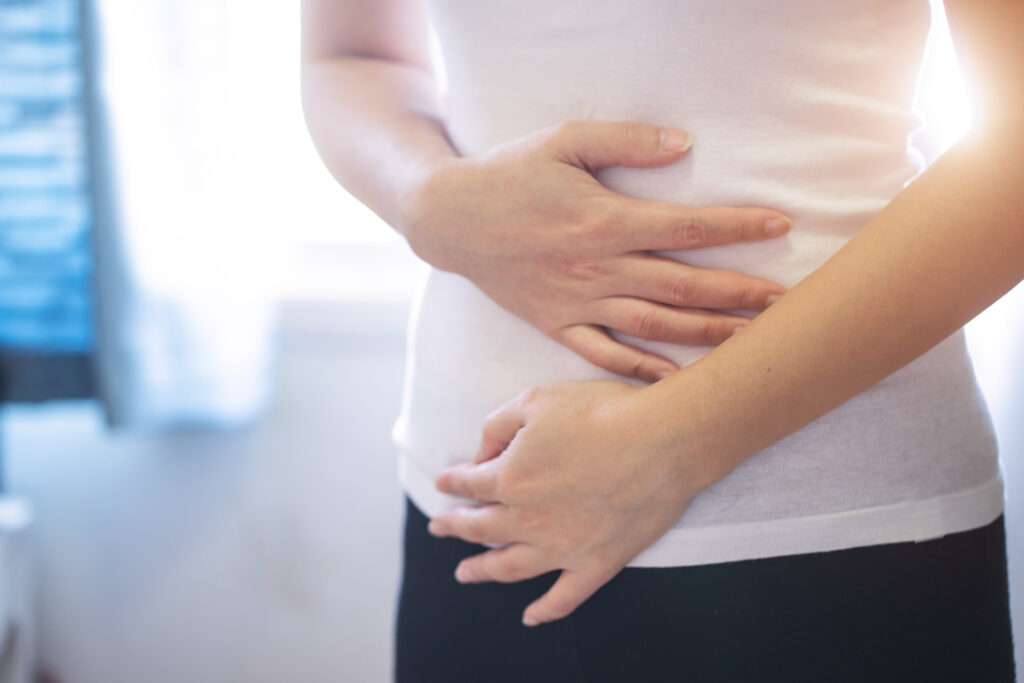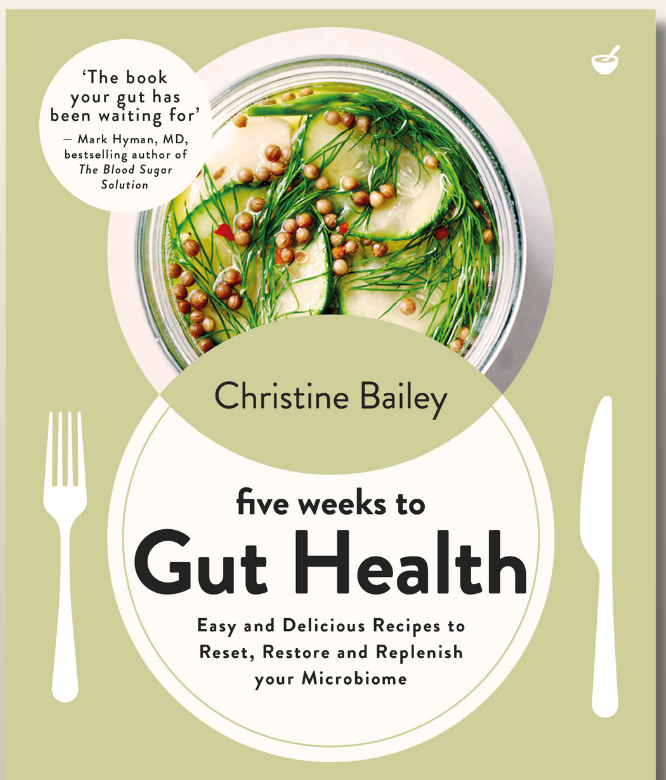From Bloat to Balance: The Five-Week Gut Reset for IBS Relief
Irritable Bowel Syndrome (IBS) is one of the most common gastrointestinal disorders, affecting approximately 10–20% of people worldwide, with a higher prevalence in women — nearly 70% of diagnosed individuals are female.
IBS is associated with a combination of abdominal pain, bloating, diarrhoea and/or constipation, but also extends far beyond the gut. People with IBS often report:
- Persistent fatigue
- Sleep disturbances
- Anxiety and depression
- Difficulty with concentration (“brain fog”)
- Disrupted social and work life
Although IBS is classed as a functional disorder (no structural damage or visible disease), its effects on quality of life can be profound — impacting relationships, confidence, eating behaviours and overall wellbeing (1,2)

The good news? While there’s no one-size-fits-all cure, diet and lifestyle have been shown to significantly reduce symptoms and help many people regain control. This is outlined in my second edition of my book Five Weeks to Gut Health
The 5R Framework: A Roadmap to Gut Reset
From the Five Weeks to Gut Health programme, taking a personalised approach can help identify underlying triggers and restore balance. This is based on the Institute of Functional Medicine approach which aligns with research suggesting that IBS symptoms are often multifactorial — involving dysbiosis, gut permeability, food sensitivities, and visceral hypersensitivity [3]. The five areas are a reminder that we need to take a personalised approach – some of these will be more relevant to certain people than others.
- Remove: Eliminate triggers (e.g., FODMAPs, alcohol, irritants, histamine rich foods)
- Replace: Support digestion where needed with enzymes, acid, or bile support and consider any nutrient deficiencies
- Repopulate: Introduce probiotics and fermented foods
- Repair: Use nutrients and foods that support the gut barrier and lower inflammation
- Rebalance: Improve stress management, sleep, and movement
Fibre and Fermentability: Getting the Balance Right
We have probably all heard that fibre is essential for gut health — but not all fibre is equal when it comes to IBS.
- Soluble fibres (e.g., oats, flaxseed, chia, psyllium) help form soft stools and nourish the microbiota. They are generally better tolerated and associated with reduced bloating and improved motility [4].
- Insoluble fibres (e.g., wheat bran) can worsen symptoms in some, particularly those with IBS-C (constipation-predominant IBS).
In one clinical trial, consumption of 2–3 kiwifruit per day significantly increased bowel movements and reduced IBS symptoms [5].
FODMAPs: Short-Term Tool, Not a Long-Term Fix
The low FODMAP diet, developed by Monash University, is a well-established first-line intervention for IBS. FODMAPs (fermentable oligosaccharides, disaccharides, monosaccharides and polyols) are short-chain carbohydrates that are poorly absorbed and readily fermented, causing gas and osmotic symptoms .
While effective, long-term restriction is not advisable, as it can negatively impact microbial diversity — particularly reducing Bifidobacteria species. Reintroduction under guidance is essential for maintaining a healthy, diverse microbiome.
Polyphenols: Anti-Inflammatory and Microbiota-Modulating
Polyphenols are plant-based compounds with antioxidant, antimicrobial, and anti-inflammatory effects. Importantly, they:
- Stimulate growth of Lactobacillus and Bifidobacterium
- Suppress harmful pathogens
- Support short-chain fatty acid (SCFA) production
A recent meta-analysis found that polyphenol supplementation increased Lactobacillus by 220% and Bifidobacterium by 56%, significantly improving gut microbial balance
Sources of ellagic acid, a key polyphenol shown to reduce IBS symptoms and inflammatory markers (e.g. CRP, IL-6), include blackberries, raspberries, pomegranate, and walnuts.
Probiotics and Fermented Foods
Probiotic foods (e.g., kefir, kimchi, sauerkraut, live yogurt) introduce beneficial strains and bioactive metabolites that support microbial balance and reduce gut inflammation. Clinical trials show that fermented foods (6)
- Increase microbiota diversity
- Improve symptoms like bloating, pain, and stool regularity
- Modulate inflammatory markers
Interestingly, a study comparing pasteurised and unpasteurised sauerkraut showed symptom improvements and beneficial microbiota shifts in both groups — though the unpasteurised group gained more spp such as Lactobacillus plantarum (7)
What to Reduce or Remove
IBS patients may benefit from reducing or a trial elimination of certain foods. Examples of these include:
| Trigger | Reason |
| Alcohol | Increases gut permeability, microbiota imbalance, and histamine load |
| Caffeine | Stimulates gut motility and can exacerbate diarrhoea or pain |
| Artificial sweeteners | Linked to microbiome changes, inflammation, and motility issues (8) |
| Histamine-rich foods | Worsen symptoms in sensitive individuals (e.g., fermented foods, wine, cured meats) (9) |
| Ultra-processed foods | Low in fibre, high in additives and linked to gut barrier dysfunction and microbial shifts |
Five weeks to gut health emphasises avoiding restrictive diets and looking to support a diverse microbiome for long term health
Addressing the Gut–Brain Axis
The enteric nervous system (“second brain”) communicates bidirectionally with the central nervous system (10). Stress, anxiety, and poor sleep can exacerbate gut sensitivity and motility issues. Interventions such as breathwork, cognitive behavioural therapy (CBT), mindfulness, yoga, and exercise have demonstrated positive outcomes for IBS management.
Nourishing your Gut long term
IBS can feel overwhelming — unpredictable symptoms, food fears, and the emotional toll it takes are all very real. With the right strategies, personalised support, and a focus on nourishment and dietary diversity rather than restriction, it is possible to take back control of your gut health.
Whether you’re starting small with simple dietary changes or ready to explore a more structured gut-healing plan, five weeks to gut health provides you with the tools, recipes and meal plans to get you started.

References
- Canavan C, West J, Card T. Review article: the economic impact of the irritable bowel syndrome. Aliment Pharmacol Ther. 2014 Nov;40(9):1023-34. doi: 10.1111/apt.12938. Epub 2014 Sep 9. PMID: 25199904.
- Black, Christopher J et al. Functional gastrointestinal disorders: advances in understanding and management The Lancet, Volume 396, Issue 10263, 1664 – 1674
- Holtmann GJ, Ford AC, Talley NJ. Pathophysiology of irritable bowel syndrome. Lancet Gastroenterol Hepatol. 2016 Oct;1(2):133-146. doi: 10.1016/S2468-1253(16)30023-1. Epub 2016 Sep 8. PMID: 28404070.
- Eswaran S, Muir J, Chey WD. Fiber and functional gastrointestinal disorders. Am J Gastroenterol. 2013 May;108(5):718-27. doi: 10.1038/ajg.2013.63. Epub 2013 Apr 2. PMID: 23545709.
- Gearry R, Fukudo S, Barbara G, Kuhn-Sherlock B, Ansell J, Blatchford P, Eady S, Wallace A, Butts C, Cremon C, Barbaro MR, Pagano I, Okawa Y, Muratubaki T, Okamoto T, Fuda M, Endo Y, Kano M, Kanazawa M, Nakaya N, Nakaya K, Drummond L. Consumption of 2 Green Kiwifruits Daily Improves Constipation and Abdominal Comfort-Results of an International Multicenter Randomized Controlled Trial. Am J Gastroenterol. 2023 Jun 1;118(6):1058-1068. doi: 10.14309/ajg.0000000000002124. Epub 2022 Dec 20. PMID: 36537785; PMCID: PMC10226473.
- Kim, Hee-Young et al. Kimchi improves irritable bowel syndrome: results of a randomized, double-blind placebo-controlled study Food & Nutrition Research 66. DO – 10.29219/fnr.v66.8268
- Nielsen, E. S., Garnås, E., Jensen, K. J., Hansen, L. H., Olsen, P. S., Ritz, C., Krych, L., & Nielsen, D. S. (2018). Lacto-fermented sauerkraut improves symptoms in IBS patients independent of product pasteurisation – a pilot study. Food & Function, 9(10), 5323-5335. https://doi.org/10.1039/c8fo00968f
- Mendoza-Martínez, V.M.; Zavala-Solares, M.R.; Espinosa-Flores, A.J.; León-Barrera, K.L.; Alcántara-Suárez, R.; Carrillo-Ruíz, J.D.; Escobedo, G.; Roldan-Valadez, E.; Esquivel-Velázquez, M.; Meléndez-Mier, G.; et al. Is a Non-Caloric Sweetener-Free Diet Good to Treat Functional Gastrointestinal Disorder Symptoms? A Randomized Controlled Trial. Nutrients 2022, 14, 1095. https://doi.org/10.3390/nu14051095
- Fabisiak A, Włodarczyk J, Fabisiak N, Storr M, Fichna J. Targeting Histamine Receptors in Irritable Bowel Syndrome: A Critical Appraisal. J Neurogastroenterol Motil. 2017 Jul 30;23(3):341-348. doi: 10.5056/jnm16203. PMID: 28551943; PMCID: PMC5503283.
- Chen et al Neurotransmitter and Intestinal Interactions: Focus on the Microbiota-Gut-Brain Axis in Irritable Bowel Syndrome Front. Endocrinol., 16 February 2022 Sec. Gut Endocrinology Volume 13 – 2022 | https://doi.org/10.3389/fendo.2022.817100.

